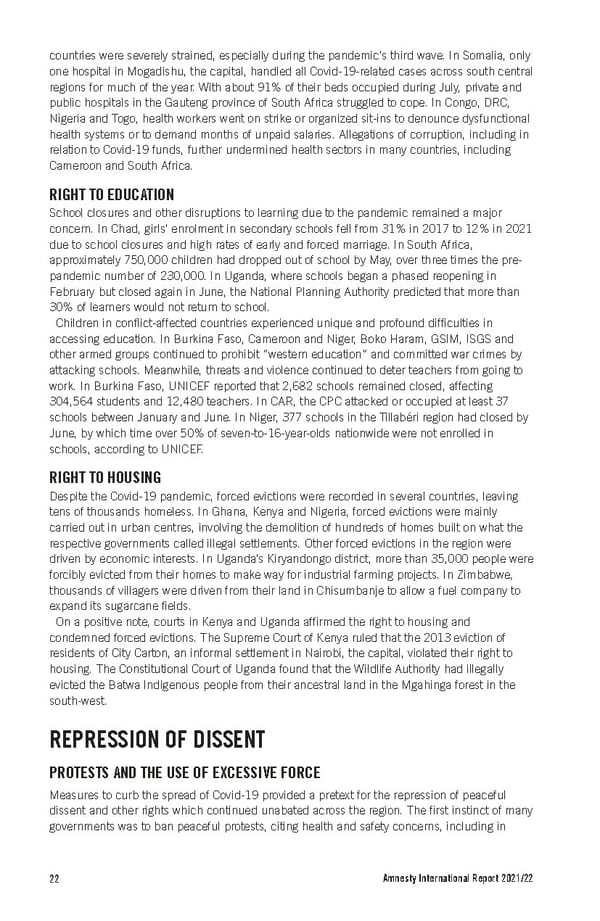countries were severely strained, especially during the pandemic’s third wave. In Somalia, only one hospital in Mogadishu, the capital, handled all Covid-19-related cases across south central regions for much of the year. With about 91% of their beds occupied during July, private and public hospitals in the Gauteng province of South Africa struggled to cope. In Congo, DRC, Nigeria and Togo, health workers went on strike or organized sit-ins to denounce dysfunctional health systems or to demand months of unpaid salaries. Allegations of corruption, including in relation to Covid-19 funds, further undermined health sectors in many countries, including Cameroon and South Africa. RIGHT TO EDUCATION School closures and other disruptions to learning due to the pandemic remained a major concern. In Chad, girls’ enrolment in secondary schools fell from 31% in 2017 to 12% in 2021 due to school closures and high rates of early and forced marriage. In South Africa, approximately 750,000 children had dropped out of school by May, over three times the pre- pandemic number of 230,000. In Uganda, where schools began a phased reopening in February but closed again in June, the National Planning Authority predicted that more than 30% of learners would not return to school. Children in conflict-affected countries experienced unique and profound difficulties in accessing education. In Burkina Faso, Cameroon and Niger, Boko Haram, GSIM, ISGS and other armed groups continued to prohibit “western education” and committed war crimes by attacking schools. Meanwhile, threats and violence continued to deter teachers from going to work. In Burkina Faso, UNICEF reported that 2,682 schools remained closed, affecting 304,564 students and 12,480 teachers. In CAR, the CPC attacked or occupied at least 37 schools between January and June. In Niger, 377 schools in the Tillabéri region had closed by June, by which time over 50% of seven-to-16-year-olds nationwide were not enrolled in schools, according to UNICEF. RIGHT TO HOUSING Despite the Covid-19 pandemic, forced evictions were recorded in several countries, leaving tens of thousands homeless. In Ghana, Kenya and Nigeria, forced evictions were mainly carried out in urban centres, involving the demolition of hundreds of homes built on what the respective governments called illegal settlements. Other forced evictions in the region were driven by economic interests. In Uganda’s Kiryandongo district, more than 35,000 people were forcibly evicted from their homes to make way for industrial farming projects. In Zimbabwe, thousands of villagers were driven from their land in Chisumbanje to allow a fuel company to expand its sugarcane fields. On a positive note, courts in Kenya and Uganda affirmed the right to housing and condemned forced evictions. The Supreme Court of Kenya ruled that the 2013 eviction of residents of City Carton, an informal settlement in Nairobi, the capital, violated their right to housing. The Constitutional Court of Uganda found that the Wildlife Authority had illegally evicted the Batwa Indigenous people from their ancestral land in the Mgahinga forest in the south-west. REPRESSION OF DISSENT PROTESTS AND THE USE OF EXCESSIVE FORCE Measures to curb the spread of Covid-19 provided a pretext for the repression of peaceful dissent and other rights which continued unabated across the region. The first instinct of many governments was to ban peaceful protests, citing health and safety concerns, including in Amnesty International Report 2021/22 22
 Amnesty International Report 2021/22 Page 21 Page 23
Amnesty International Report 2021/22 Page 21 Page 23